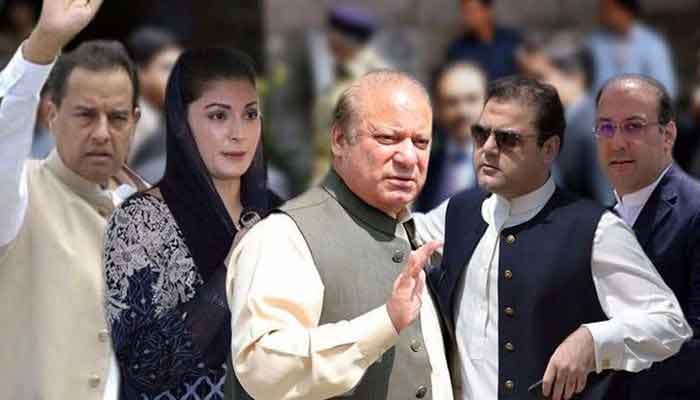Accountability court verdict mentions patriarchy in Sharif family
“On the contrary, before the JIT, the two sons have given the impression of a tightly knit family where the decisions are made by the patriarch which are not questioned or challenged by other younger family members who may be merely informed of the same subsequently,” the judgment reads.
ISLAMABAD: In his verdict against former Prime Minister Nawaz Sharif and his sons in the Al-Azizia Steel Mills case, Accountability Court Judge Arshad Malik made interesting remarks about patriarchy in Sharif family.
The judge held in his decision announced on Monday that from the time of Mian Muhammad Sharif, the late father of former PM, the concept of benami for holding the properties abroad was a routine practice within the Sharif family.
While discussing the non-appearance of Nawaz’s sons Hussain before the Supreme Court to present the money trail, the Judge said: “The Accused No. 1 (Nawaz), No. 2 (Hassan Nawaz) and No. 3 (Hussain Nawaz) are very closely related and members of a tightly knit, monolithic, patriarchal family with close association and jointly held financial and business interests.”
According to verdict there was nothing on record to even remotely suggest any estrangement, antagonism, hostility or antipathy between the three. “On the contrary, before the JIT, the two sons have given the impression of a tightly knit family where the decisions are made by the patriarch which are not questioned or challenged by other younger family members who may be merely informed of the same subsequently,” the judgment reads.
It says accused Hussain Nawaz Sharif is the person who claimed himself to be the sole proprietor of Hill Metals Establishment (HME) and admits sending of remittances from KSA (Kingdom of Saudi Rabia) to accused Mian Muhammad Nawaz Sharif but has not opted to appear.
“Accused No. 3, Hussain Nawaz Sharif, was the person who could have deposed on oath to prove the stance put forth before the Supreme Court and to furnish and place on record money trail so as to dislodge the presumption against the Accused No. 1 (Nawaz Sharif) but significantly, he has not opted to appear,” the decision said.
The judge further wrote that the fact that the late father of Nawaz did indulge in the practice of holding “assets”; and “property” (within the meaning of the Ordinance) indirectly, through one or more benamidars, had also been proved from the evidence on record, “which shows that GSM (Gulf Steel Mill) was held in the name of the cousin of the Accused No. 1 (i.e. one Tariq Shafi) but the latter was not its true beneficial owner.”
This too, the judge wrote, was a strong indicator of the fact that concept of benami and using the same as device for holding the properties abroad, so that the identity the real beneficial owner(s) remains shrouded in secrecy, “was a routine practice within the family of the accused.”
According to verdict, the court was satisfied that the accused No. 1 (Nawaz) was one of the most influential members of the monolithic and tightly connected Sharif family and that after the death of his father in October 2004, he was for all practical purposes the head of and most influential member of the Sharif family.
-
 Neve Campbell Explains Why She Avoids Watching Scary Movies As She Returns To 'Scream 7'
Neve Campbell Explains Why She Avoids Watching Scary Movies As She Returns To 'Scream 7' -
 Milan Tram Crash Leaves Two Dead, 39 Injured
Milan Tram Crash Leaves Two Dead, 39 Injured -
 Timothee Chalamet Touches On His Personality's Relatability With 'Marty Supreme' Role
Timothee Chalamet Touches On His Personality's Relatability With 'Marty Supreme' Role -
 Benny Blanco Explains Why His Feet Were Dirty During Podcast Debut
Benny Blanco Explains Why His Feet Were Dirty During Podcast Debut -
 Jake Humphrey Shares The Powerful Meaning Behind His Wrist Tattoo
Jake Humphrey Shares The Powerful Meaning Behind His Wrist Tattoo -
 Matthew Lillard Weighs In On His Return To The 'Scream' Franchise After Decades Of Persistence
Matthew Lillard Weighs In On His Return To The 'Scream' Franchise After Decades Of Persistence -
 Travis, Jason Kelce Share Blunt Dating Advice For Men: 'She's Gonna Hate You'
Travis, Jason Kelce Share Blunt Dating Advice For Men: 'She's Gonna Hate You' -
 Australia To Launch First High-speed Bullet Train After 50-years Delay
Australia To Launch First High-speed Bullet Train After 50-years Delay -
 Meghan Markle Turns To Desperate Bids & Her Kids Are Her ‘saving Grace’: Here’s What They’ll Do
Meghan Markle Turns To Desperate Bids & Her Kids Are Her ‘saving Grace’: Here’s What They’ll Do -
 King Charles Gives A Nod To Sister Anne's Latest Royal Visit
King Charles Gives A Nod To Sister Anne's Latest Royal Visit -
 Christian Bale Shares Rare Views On Celebrity Culture Urging Fans Not To Meet Him In Person
Christian Bale Shares Rare Views On Celebrity Culture Urging Fans Not To Meet Him In Person -
 Ariana Grande To Skip Actor Awards Despite Major Nomination
Ariana Grande To Skip Actor Awards Despite Major Nomination -
 North Carolina Teen Accused Of Killing Sister, Injuring Brother In Deadly Attack
North Carolina Teen Accused Of Killing Sister, Injuring Brother In Deadly Attack -
 Ryan Gosling Releases Witty 'Project Hail Mary' Ad With Sweet Reference To Eva Mendes
Ryan Gosling Releases Witty 'Project Hail Mary' Ad With Sweet Reference To Eva Mendes -
 Teyana Taylor Reveals What Lured Her Back To Music After Earning Fame In Acting Industry
Teyana Taylor Reveals What Lured Her Back To Music After Earning Fame In Acting Industry -
 Prince William Shows He's Ready To Lead The Monarchy Amid Andrew Scandal
Prince William Shows He's Ready To Lead The Monarchy Amid Andrew Scandal




